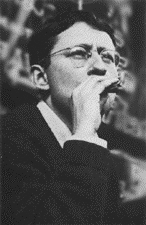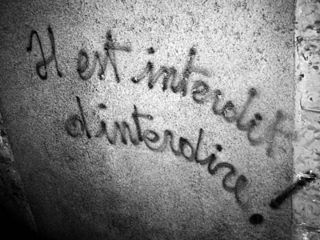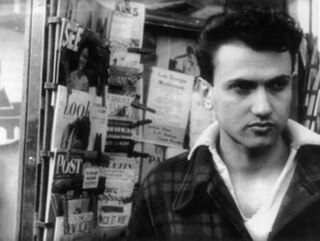Notes
- 1 2 Bio at PEN American Center Archived October 4, 2012, at the Wayback Machine
- ↑ Bio at opendemocracy.net Archived February 16, 2009, at the Wayback Machine
- 1 2 Donald Nicholson-Smith at The Library at nothingness.org
- ↑ Bopsecrets.org
Donald Nicholson-Smith is a translator and freelance editor, interested in literature, art, psychoanalysis, social criticism, theory, history, crime fiction, and cinema. [1] [2] Born in Manchester, England, he was an early translator of Situationist material into English. [3] He joined the English section of the Situationist International in 1965 and was expelled in December 1967. [3] [4] He lives in New York City. [1]

The Situationist International (SI) was an international organization of social revolutionaries made up of avant-garde artists, intellectuals, and political theorists. It was prominent in Europe from its formation in 1957 to its dissolution in 1972. The intellectual foundations of the Situationist International were derived primarily from libertarian Marxism and the avant-garde art movements of the early 20th century, particularly Dada and Surrealism. Overall, situationist theory represented an attempt to synthesize this diverse field of theoretical disciplines into a modern and comprehensive critique of mid-20th century advanced capitalism.

Guy-Ernest Debord was a French Marxist theorist, philosopher, filmmaker, critic of work, member of the Letterist International, founder of a Letterist faction, and founding member of the Situationist International. He was also briefly a member of Socialisme ou Barbarie.

The Letterist International (LI) was a Paris-based collective of radical artists and cultural theorists between 1952 and 1957. It was created by Guy Debord and Gil J. Wolman rejoined by Jean-Louis Brau and Serge Berna as a schism from Isidore Isou's Lettrist group. The group went on to join others in forming the Situationist International, taking some key techniques and ideas with it.

Psychogeography is the exploration of urban environments that emphasizes interpersonal connections to places and arbitrary routes. It was developed by members of the Letterist International and Situationist International, which were revolutionary groups influenced by Marxist and anarchist theory as well as the attitudes and methods of Dadaists and Surrealists. In 1955, Guy Debord defined psychogeography as "the study of the precise laws and specific effects of the geographical environment, consciously organized or not, on the emotions and behavior of individuals." One of the key tactics for exploring psychogeography is the loosely defined urban walking practice known as the dérive. As a practice and theory, psychogeography has influenced a broad set of cultural actors, including artists, activists and academics.
List of people that, at different times, have been members of the Situationist International:

The dérive is a revolutionary strategy originally put forward in the "Theory of the Dérive" (1956) by Guy Debord, a member at the time of the Letterist International. Debord defines the dérive as "a mode of experimental behaviour linked to the conditions of urban society: a technique of rapid passage through varied ambiances." It is an unplanned journey through a landscape, usually urban, in which participants drop their everyday relations and "let themselves be drawn by the attractions of the terrain and the encounters they find there". Though solo dérives are possible, Debord indicates
that the most fruitful numerical arrangement consists of several small groups of two or three people who have reached the same level of awareness, since cross-checking these different groups' impressions makes it possible to arrive at more objective conclusions.

The Society of the Spectacle is a 1967 work of philosophy and Marxist critical theory by Guy Debord, in which the author develops and presents the concept of the Spectacle. The book is considered a seminal text for the Situationist movement. Debord published a follow-up book Comments on the Society of the Spectacle in 1988.

Isidore Isou, born Isidor Goldstein, was a Romanian-born French poet, dramaturge, novelist, film director, economist, and visual artist who lived in the 20th century. He was the founder of Lettrism, an art and literary movement which owed inspiration to Dada and Surrealism.
Jean-Patrick Manchette was a French crime novelist credited with reinventing and reinvigorating the genre. He wrote ten short novels in the seventies and early eighties, and is widely recognized as the foremost French crime fiction author of that period. His stories are violent explorations of the human condition and French society. Manchette was politically to the left and his writing reflects this through his analysis of social positions and culture.
Peter Wollen was a film theorist and filmmaker. He studied English at Christ Church, Oxford. Both political journalist and film theorist, Wollen's Signs and Meaning in the Cinema (1969) helped to transform the discipline of film studies by incorporating the methodology of structuralism and semiotics. He taught film at a number of universities and was Professor Emeritus at the University of California, Los Angeles at the time of his retirement from academe in 2005.
Timothy James "T. J." Clark is a British art historian and writer. He taught art history in a number of universities in England and the United States, including Harvard and the University of California, Berkeley.
Alice Becker-Ho, also known as Alice Debord, is a Chinese-born French intellectual closely associated with the Situationist International. Among other works, she has written poetry, a scholarly study of slang, and a travel memoir. The widow of Guy Debord, she is best known for being the editor of his complete letters, which have been published in eight volumes.

Michèle Bernstein is a French novelist and critic, most often remembered as a member of the Situationist International from its foundation in 1957 until 1967, and as the first wife of its most prominent member, Guy Debord.
Gérard Lebovici was a French film producer, editor and impresario.

Pierre Mac Orlan, sometimes written MacOrlan, was a French novelist and songwriter.

Ken Knabb is an American writer, translator, and radical theorist, known for his translations of Guy Debord and the Situationist International. His own English-language writings, many of which were anthologized in Public Secrets (1997), have been translated into over a dozen additional languages. He is also a respected authority on the political significance of Kenneth Rexroth.

Mémoires (Memories) is an artist's book made by the French social critic Guy Debord in collaboration with the Danish artist Asger Jorn. Its last page mentions that it was printed in 1959, however, it was printed in December 1958. This publication is the second of two collaborative books by Jorn and Debord whilst they were both members of the Situationist International.

Situationist prank is a term used in the mass media to label a distinctive tactic by the Situationist International, consisting of setting up a subversive political prank, hoax or stunt; In the terminology of the Situationist International, stunts and media pranks are very similar to situations. The détournement technique, that is "turning expressions of the capitalist system against itself," was the essential element of a situationist prank. The Situationist tactic of using détournement for subversive pranks is such a distinctive and influential aspect of the Situationist International, that they are sometimes labeled as a group of political pranksters.
Jean-Paul Clébert was a French writer.

Socialisme ou Barbarie was a French-based radical libertarian socialist group of the post-World War II period whose name comes from a phrase which was misattributed to Friedrich Engels by Rosa Luxemburg in the Junius Pamphlet, but which probably was most likely first used by Karl Kautsky. It existed from 1948 until 1967. The animating personality was Cornelius Castoriadis, also known as Pierre Chaulieu or Paul Cardan. Socialisme ou Barbarie is also the name of the group's journal.